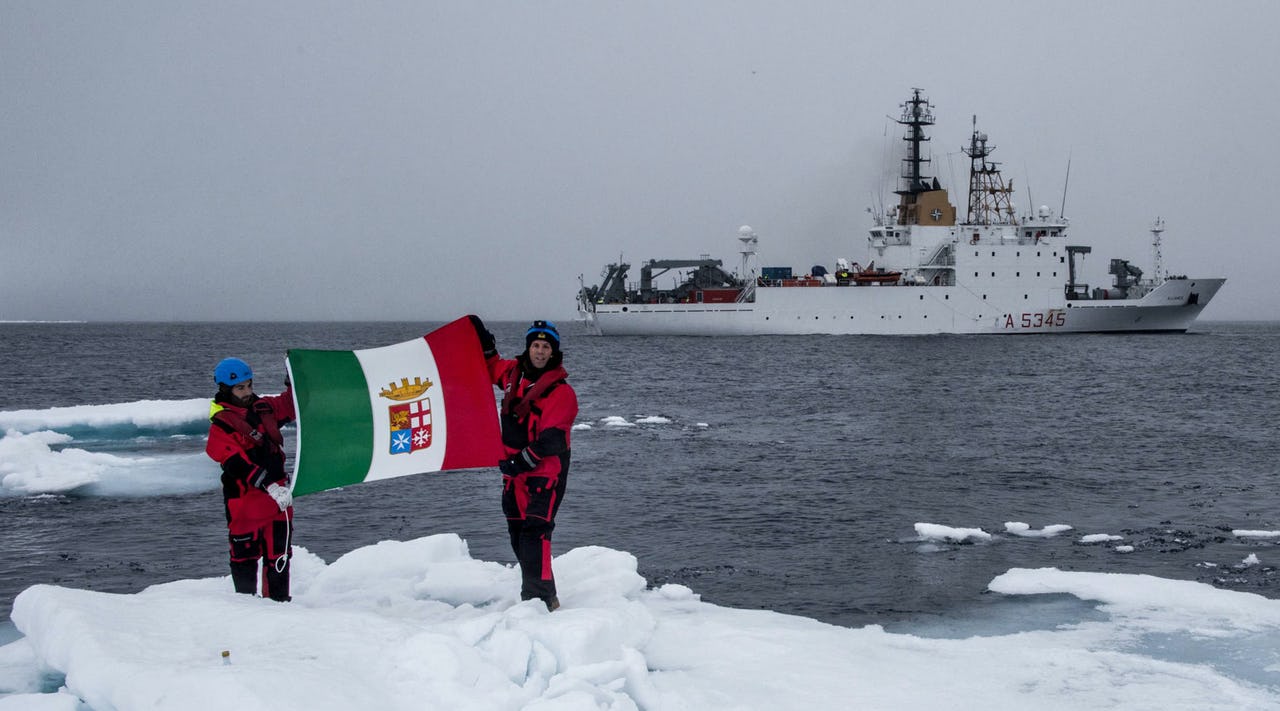Far but not so far: Italy’s Role and Interests in the Arctic

The 2018 Italian mission to the Arctic Circle with the “Alliance” ship led by the Italian Navy. Photo: Marina Militare
In recent years we have witnessed a growing interest in the Arctic region among countries such as the United States, Russia or China. This interest is not only a concern for those countries bordering the area, but also for the ones which are very far away from it, but are interested in playing a role there. Among these global forces and smaller Arctic countries such as Norway, Iceland, Denmark, there are also countries like Italy, that have strong economic and political interests and have played an historical scientific role there.
Since 2013, Italy has participated in the Arctic Council as an observer state due to its strong activity and commitment in the area, which has been increasing through the years both at a scientific and economic level.
Even though Italy is not an Arctic country, Rome has been playing an important role there for a very long time. The interest in the area is also shown by the adoption of the National Strategy for the Arctic by the Ministry of Foreign Affairs in 2015.
Italy’s polar history dates back one hundred years, with expeditions by the Duke of Abruzzi in 1899 and the following missions of Umberto Nobile in 1926 and 1928. Italy’s interest in the Arctic has continued over the years through the action of explorers and scientists.
In 1997 the National Council of Research (CNR) opened an observation platform in Ny Ålesund on Svalbard, which represents the beginning of Italy’s permanent presence in the Arctic for the development of research. Over the years, Italy has intensified its activities in the region, consolidating its presence at a high scientific level.
As an Arctic Council Observer, Italy is strongly engaged at a diplomatic level in the region. It considers the Council as the main area for the discussion of a complex region, and its presence there important for its own interests. Threats arising from climate change affect the Nordic seas and the Mediterranean Sea, and it is possible to see some similarities between Nordic ecosystems and those in Italy, especially among the maritime areas and the mountainous regions. Because of that, the development of scientific research for sustainable development in the Arctic is also fundamental for Italy’s own territory.
Moreover, Rome considers the Arctic Council not only a tool for multilateral cooperation but also for bilateral talks. At the latter level, informal discussions had been launched with the local Sami Council with the specific goal to boost academic cooperation for a deepening of the Arctic cultural heritage knowledge.
However, Italian interests are not only limited to research and academic projects. The Arctic has played a very important role in the Mediterranean country’s energy sector. The relevant engagement of the National Hydrocarbons Agency (ENI), which is the most important Italian energy company, has risen in the last few years.
In 2016, the Italian company inaugurated the oil platform Goliath, which is the biggest floating base for oil extraction in the world, and in 2019, it has acquired the Oooguruk oil platform in Alaska which, jointly with the Nikaitchuq oil plant, guaranteed a sharp increase for its oil production.
ENI is also engaged in the implementation of a Climate Strategy with the aim of reducing the impact of its oil production projects in the area and enhancing a low-carbon economic transition.
Italy’s Arctic presence is also linked to strong participation in Russian’s energy projects. Many Italian companies, such as ENI, Saipem, and Nuovo Pignone, participate in the development of the Arctic-LNG 2 and Yamal LNG projects for the production of liquefied gas in northern Siberia.
Moreover, it is also important to mention the example of the Italian National Agency for Electricity (ENEL) a multinational company active in the sectors of electricity generation and gas distribution, which is strongly involved in the development of renewable projects in Russia, and which has recently started the building of the largest wind power plant in the Arctic Circle, the Kolskaya wind plant.
Of additional significance is Italy’s involvement in the EU’s “Horizon 2020” initiative concerning the Nordic region. Leonardo, a multinational Italian company specialized in aerospace, defence and security, is working within the European project ARCSAR (Arctic Security and Emergency Preparedness Network) to deploy high-tech innovation systems for search and rescue and radar for navigation aid in the Arctic. This project is proceeding together with e-Geos, a company working on the earth observation and geo-spatial information business which is also in charge of the Cosmo-SkyMed, the Italian’s satellite system created with the aim of monitoring the retreat of the Arctic ice.
It is also worth mentioning the example of Fincantieri, the largest shipbuilding company in Europe, which has recently built a new polar ship for the Norwegian state and which gave its famous “Alliance” ship to the Italian Navy for environmental observations.
In this sense, all of these activities are assisted by the Italian Navy, which has been present in the region for many years through the High North missions, which intended to consolidate the results of scientific research.
Global warming is creating new opportunities for international development in the Arctic, which is revealing the different interests of each participating state. It remains to be seen how much of this space Italy will be able to carve out through multilateral and bilateral cooperation with different international and local actors that have always characterized the Italian foreign policy, but it is already actively involved.
Arianna Muro Pes is a Master’s graduate in International Relations at the University of Turin.